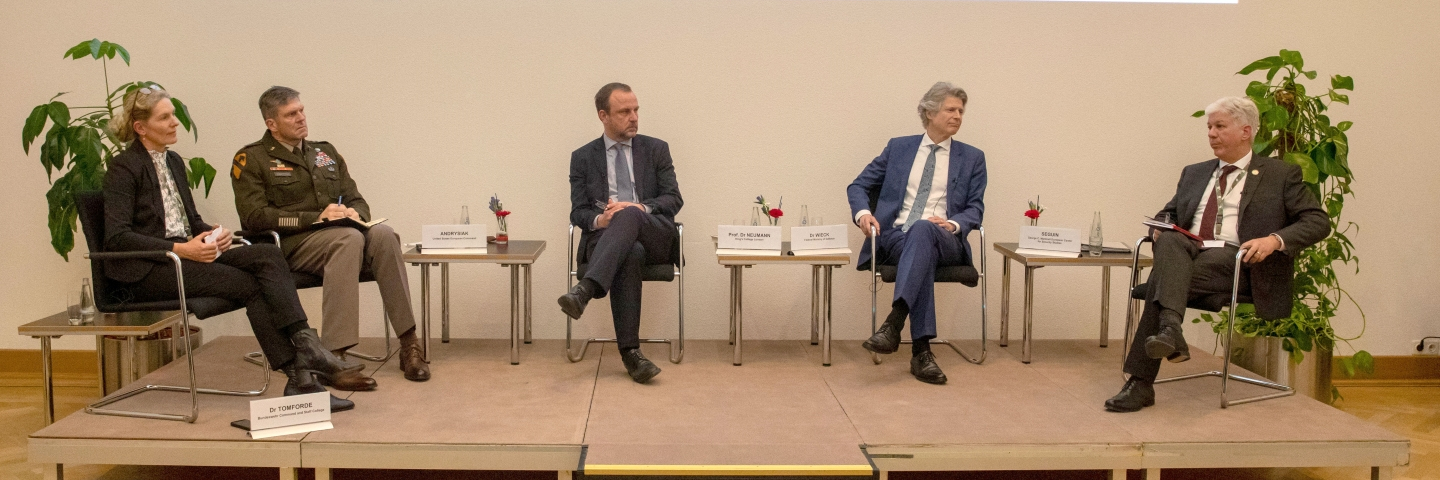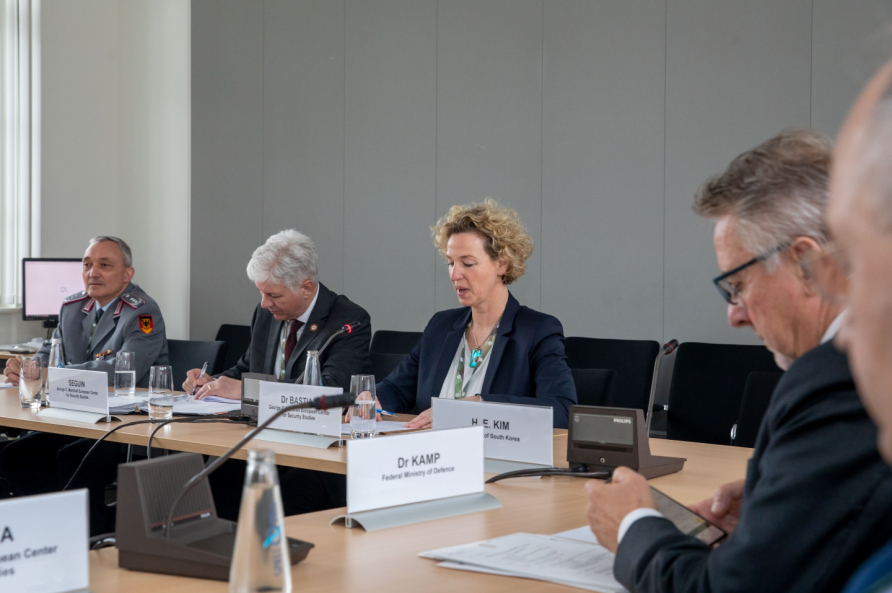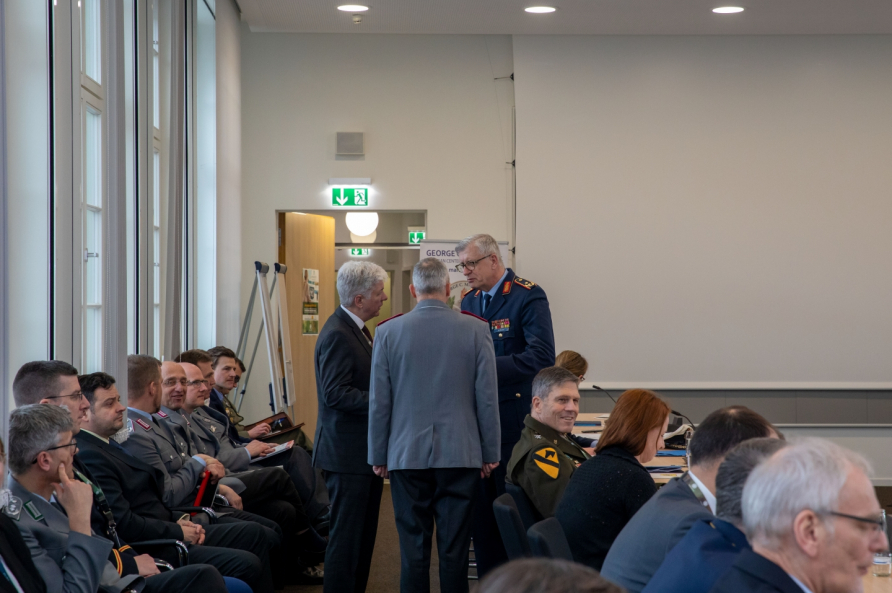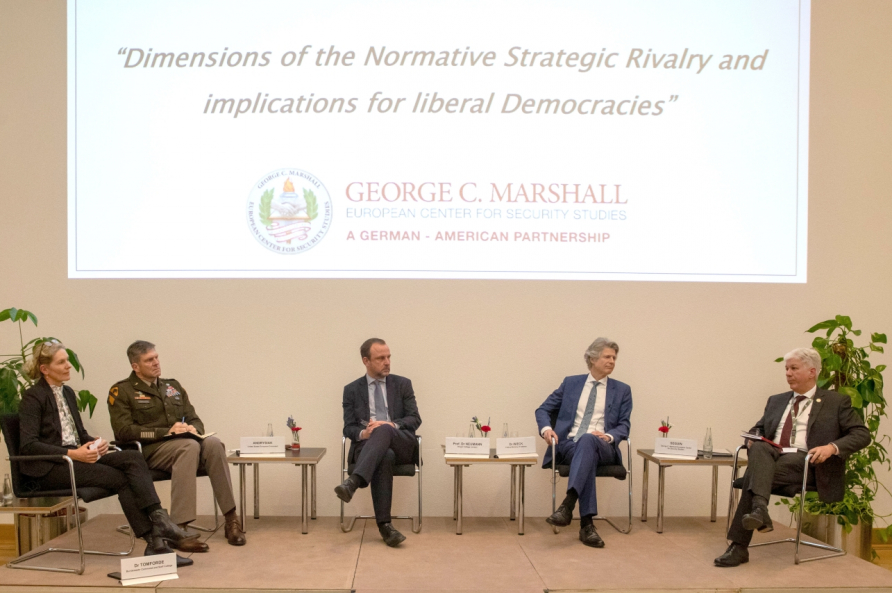
Marshall Center and German Ministry of Defense co-hosted a Workshop on Normative Strategic Competition in Berlin
On 14 March, the George C. Marshall European Center for Security Studies (GCMC) and the German Federal Ministry of Defense (FMoD) jointly conducted a workshop on the normative dimension of global strategic competition. Over 50 participants from the Ministry, the Marshall Center, Armed Forces, Diplomatic Corps in Berlin, U.S. European Command, the German Centre for Internal Leadership, the University of the German Armed Forces, and several renowned think tanks were invited to the premises of the Ministry in Stauffenbergstrasse to engage in three focus sessions. Dr. Jasper Wieck, Political Director of FMoD, and GCMC Director, Major General (ret.) Barre Seguin gave opening remarks, stressing the importance of the transatlantic relationship. COL Dr. Frank Hagemann, the most Senior German Officer at the Marshall Center and Head of the Research and Policy Analysis Department, introduced the analytical framework of the workshop.
The first session reflected on Western values as the glue for democratic societies and the liberal world order. His Excellency Kim Hong-Kyun, Ambassador of South Korea to Germany, Marshall Center Ambassador Eric Nelson, and Dr. Karl-Heinz Kamp, Advisor to the Political Director of the FMoD, discussed the differences and similarities of democracy in South Korea, the United States, and Germany. One of the key messages was that the “idea of the West” is not declining, but very lively in different parts of the world.
Session two focused on authoritarian states challenging the liberal world order – China, Russia, and Iran. Helena Legarda from the Mercator Institute for China Studies (MERICS), Dr. David Lewis from the University of Exeter, and Dr. Hamidreza Aziza from the German Institute for International and Security Affairs (SWP) explained how different the perceptions and visions of a good “world order” in these countries are. The conceptions of multilateralism, multipolarity, values, collectivism versus individualism, or the relationship between the individual and the state vary greatly from transatlantic understandings. Dr. Abdourahmane Idrissa Abdoulaye from the African Studies Centre in Leiden, Netherlands, analyzed the trajectory of the liberal world order on the African continent and gave an assessment of how China’s, Russia’s and Iran’s narratives are received in some of the 54 African states.
The impression that the “audience” of normative strategic competition – regional and emerging powers that refuse political alignment with either the West or China, Russia, or Iran – has to choose sides is not realistic. Non-aligned states rather strive to profit from the advantages of each side and prefer an “era of choice” to enhance their room of maneuver. The less capable countries may thus become more powerful.
The last session took a closer look at the mechanisms of narratives and how to use them. Prof. Dr. Natascha Zowislo-Grünewald from the University of the German Armed Forces in Munich requested Western decision-makers to invest more thought and resources in strategic communication to enhance the image of democracy, rule of law, and human rights. Major General Peter B. Andrysiak from EUCOM in Stuttgart and Major General Markus Kurczyk from the Centre for Internal Leadership of the German Armed Forces stressed the importance of education and personal development to ensure trust in future leadership and institutions, and to promote the ability of qualified judgement in times of irregular warfare in the grey zone.
Wrapping up the discussion, GCMC Dean Dr. Andrew Michta underlined the necessity to always strive for authenticity in the values we pass on. Director Seguin in his summary quoted Dean Michta in saying “we must transmit our cultural ethos, looking for an affirmative truth, or else we are resigned to relativism.”


